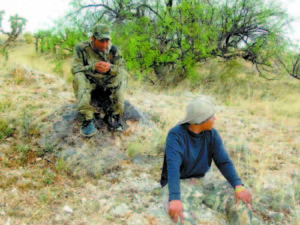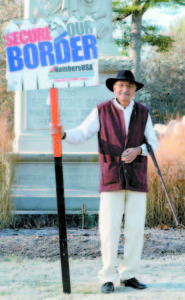On my Corner: Chatter in the brush
By Bob Casimiro
BN Columnist
Chiapas is the southernmost state in Mexico, close to 2,000 miles from southwest Arizona, where I have been making frequent treks for border watch activities. It is largely indigenous and, also, very poor, having the lowest per capita GDP (Gross Domestic Product) of all 31 Mexican states.
Chiapas is also in a very dangerous neighborhood. Guatemala, which has the fifth highest murder rate of any country in the world — in the world! — is on its southern border. You can understand why people want to get out of there, and why we encountered young males from Chiapas on two occasions trying to enter our country illegally.
The first time was in 2006 when I was in Arizona with the Minuteman Project. We were on a night shift on a dirt road off Arizona State highway 286, approximately 30 miles north of the border with Mexico. Each of our posts had two-way radio communications with headquarters, and each post had large, 12-inch diameter spotlights that would be used to “light up†the desert when we heard illegal aliens (IAs) approaching.
This one night we heard someone approaching and “lit up†the desert. We saw nothing, but ten minutes later, when things settled down, we could here chatter in the brush out in front of us. Big mistake. Sound carries great distances in the desert at night. We called the Border Patrol; an agent drove up, jumped out of his truck, took his flashlight and went off into the brush. Ten minutes later he came back with three IAs, all young guys from Chiapas. He had them empty their pockets and backpacks and, after inspection, put them in his truck and took them to a Department of Homeland Security bus at Three Points, where they were then taken to the Border Patrol Tucson District office for processing.

Two illegal aliens intercepted in the Arizona mountains by the volunteer Arizona Border Recon group are shown waiting for the Border Patrol to arrive and take them into custody. The one on the left has lost one of his “booties.†(Photo by Bob Casimiro, 2014)
The other incident was in 2014. By that time the Minuteman Project, later known as the Minuteman Civil Defense Corp (MCDC) had ceased to operate, but I was able to connect with two local groups, Phoenix-based Arizona Border Recon, and Arizona Border Defenders, a Tucson volunteer group that does weekend border watch surveillance.
I was with the Arizona Border Defenders on a Saturday in April as we trekked up into the mountains to check on some of their surveillance equipment. We inadvertently crossed paths with four IAs. Two of them dropped their packs and ran off; the other two stopped. We brought them down from the mountain and called the Border Patrol, who arrived 20 minutes later to take them into custody, and transport them to a transit point, and then into the Tucson office. They told us they were from Chiapas; one was 27 and the other 19 years old.
The drug cartels control all human and drug smuggling. Migrants who cross the border have to pay for a “coyote†to guide them, and they have to buy backpacks, jugs of water (black plastic so there will be no reflection from the sun), and “booties,†which they put on over their shoes. The “booties†have carpeting sewn on the bottom so they won’t leave footprints that can be tracked by the Border Patrol. A picture I took shows one of the IA’s having lost one of his “booties.â€
We feel no animus toward the illegals. We understand, as mentioned at the beginning of this article, the wretched conditions they live under and their desire, especially the young males we encounter, to find employment and a better situation in the United States.
But, this is my home. Not just my domicile in Bridgton, but the whole of the United States. And these are invaders; they were not invited. There is a legal way to come here and, as it is, we issue one million green cards annually. This is more than generous, more than humane, and in the view of some of us, downright excessive and reckless, especially considering the hundreds of thousands who overstay visas, the amount of fraud, and the manipulation of the system so those who are supposedly here “temporarily†find ways to make their stays permanent.
Hopefully, President Trump will be able to bring some sanity to our immigration system.


